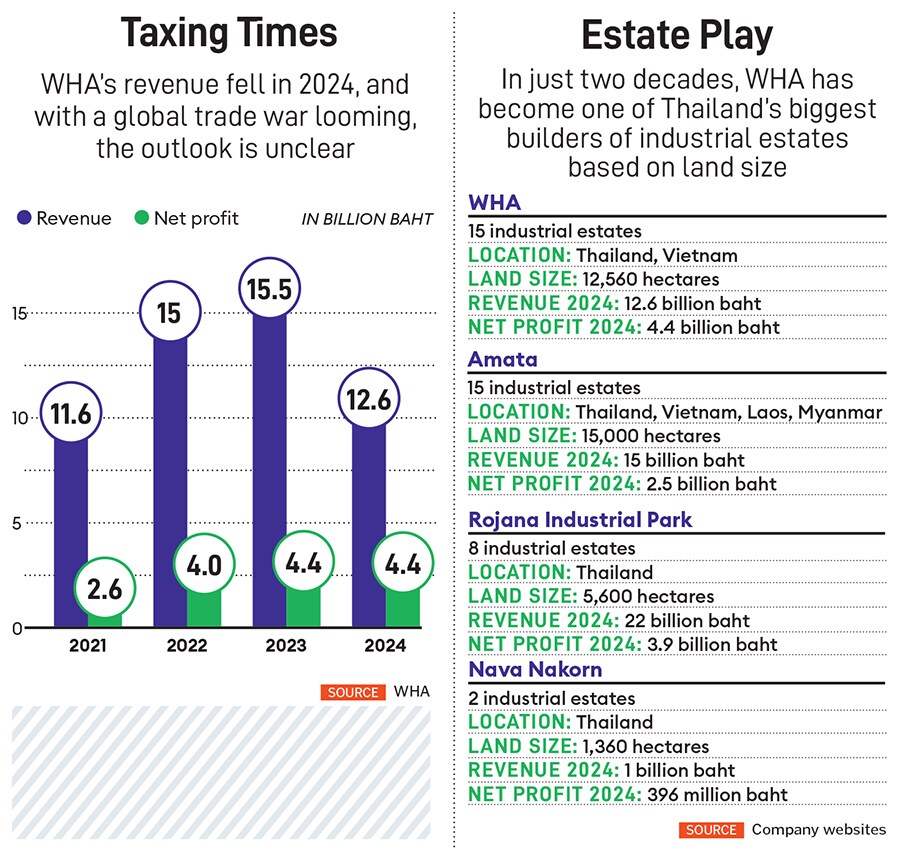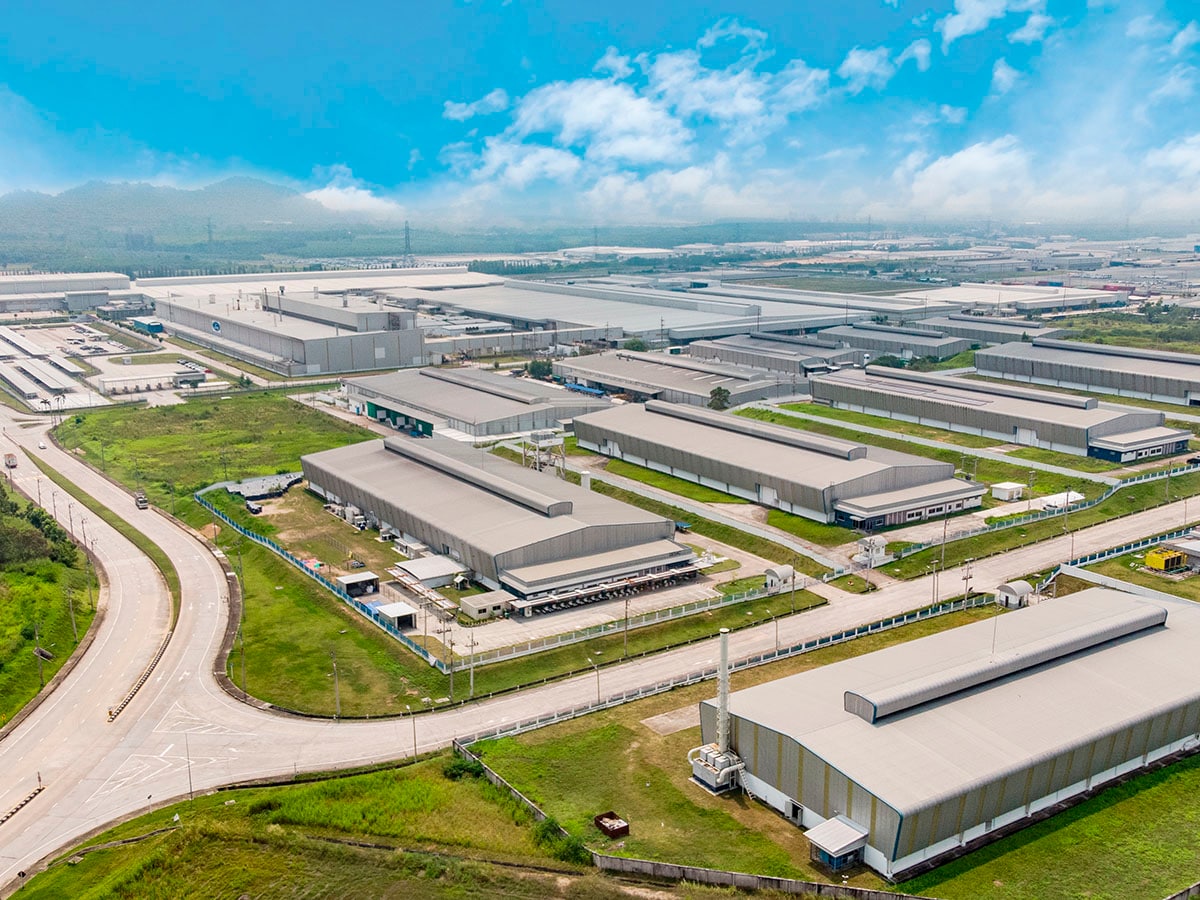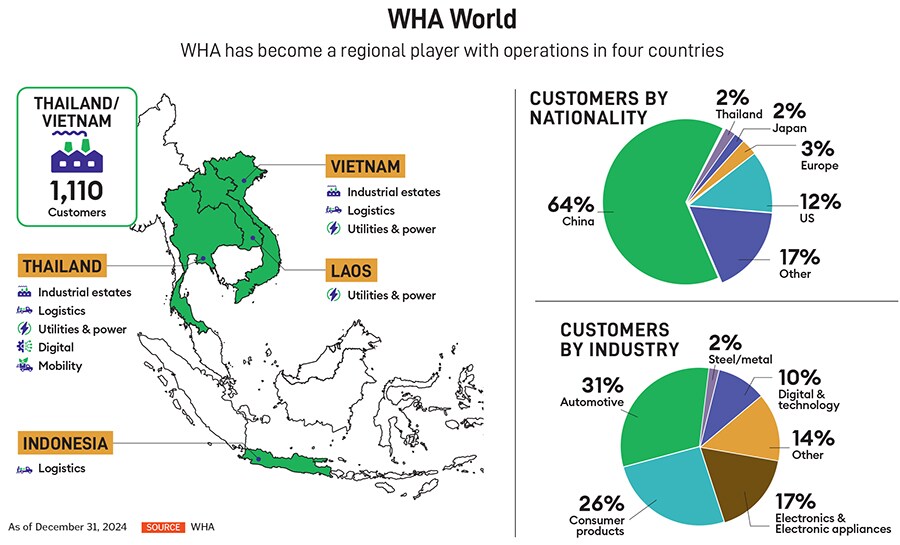China plus one: How WHA Group is building a manufacturing hub in Thailand
Co-founder and CEO Jareeporn Jarukornsakul built industrial parks developer WHA from the ground up. Now she's facing the challenge of trade turbulence head-on


About a two-hour drive southeast of Bangkok, on Thailand’s eastern seaboard, lies a vast 1.3-million-hectare expanse covering three provinces on which rests the country’s ambition of becoming a regional manufacturing powerhouse. The government-sponsored Eastern Economic Corridor (EEC) has drawn billions of dollars of investments from multinational companies looking for a production base outside China.
Factories within this rising economic zone are housed in 26 sprawling industrial estates—and more than a third of these belong to WHA group, one of the biggest industrial estate developers in the country based on land size. With 2024 consolidated revenue of 12.6 billion baht ($375 million) and group market cap of 89 billion baht, WHA, led by co-founder and CEO Jareeporn Jarukornsakul, has been at the forefront of building these “smart parks", which integrate basic amenities of power and water supply with digital infrastructure. WHA specialises in making custom-built units for its clients, who range from tech giants (Google) to EV companies (BYD) to makers of electrical appliances (Haier).
Now US President Donald Trump’s threat of punitive tariffs, announced two months after Jareeporn unveiled WHA’s 119 billion baht five-year expansion plan, presents the 57-year-old entrepreneur with one of the toughest challenges in her three-decade long business career. Speaking with Forbes Asia just after the tariff announcement, Jareeporn insists her country remains an ideal choice as a manufacturing hub, with its strategic location, supportive government policies and robust infrastructure. “I believe investment from China will continue to flow into Thailand," she maintains.

The US is the biggest export market for both Thailand and Vietnam, where WHA has one industrial park and has committed to upping the ante with a $1 billion investment. The US accounts for about 18 percent of Thailand’s exports, amounting to $55 billion, according to data from the Thai Ministry of Commerce, and about 30 percent of Vietnam’s, or $120 billion, according to Vietnam government data. Jareeporn points out that the proposed tariffs of 36 percent on Thai goods and 46 percent on exports from Vietnam, are still significantly lower than the cumulative 145 percent slapped on China in early April. “In the longer term," she says stoically, “we need to get through this chaotic period."
Given the fast-evolving scenario, analysts are still debating the impact of the trade duties, which were put on hold for three months (barring tariffs on China) while countries try to hammer out deals with Washington. Phattarachai Taweewong, a research director at property consultancy Colliers Thailand, says they will “certainly affect relocation decisions as manufacturers recalculate their moves". But Wijit Arayapisit, strategist at Bangkok-based Liberator Securities, concurs with Jareeporn, saying, “Industrial estates in Thailand still have growth potential in the mid- to long-term as a target for China relocation."

While Jareeporn acknowledges that the looming trade war may compel her to review her future investments, she’s still pressing ahead with the 20-billion-baht outlay for this year. Her five-year strategy is aimed at accelerating growth of her group: Industrial parks, which are housed under WHA Industrial Development (WHAID) customised warehouses and factories (WHA Logistics) conventional and renewable energy (SET-listed WHA Utilities & Power) telecoms infrastructure, including data centres (WHA Digital) and mobility that provides personal and commercial EVs for rent (Mobilix).
The industrial estates business, which contributes 60 percent to total group revenue and has no shortage of competitors to contend with, would get the lion’s share of funds, amounting to 37 billion baht. Domestically, WHA competes with listed players Amata, Rojana Industrial Park and Nava Nakorn,and regionally it’s up against heavyweights such as Singapore’s Mapletree and Japan’s Sumitomo, both of which are active in Thailand and Vietnam.
 Bird’s eye view of a WHA industrial parkImage: WHA Corporation PCL
Bird’s eye view of a WHA industrial parkImage: WHA Corporation PCL
The CEO has earmarked the second-largest investment tranche, 30 billion baht, for Mobilix, a new addition to her portfolio that was launched last July. In keeping with her bespoke approach, the EVs and accompanying software that Mobilix provides are tailored to customer needs. “It’s like a built-to-suit EV," explains Jareeporn. An entrepreneur at heart, she says she relishes the challenge of new ventures. “If you do the same thing, it gets boring."
To bankroll the group’s plans, Jareeporn was looking to raise funds by listing the industrial estate business but postponed the IPO in March, citing market volatility even before the tariff hit. Now she says she will draw upon internal cash flow and take on debt. “We still have a very strong financial position," she says, adding that even with increased borrowing, she’s confident of containing WHA’s net gearing ratio well below its 2.5 covenant.
The trade upheaval aside, Jareeporn remains optimistic about 2025, predicting, “WHA’s top and bottom lines will hit all-time highs." She says the company has already signed contracts and taken deposits for much of the industrial estate land that was sold and is likely to be transferred to buyers this year (the company records revenue only after the title transfer takes place.) “And the logistics, water and power businesses are also doing well," she adds. As for the $1 billion outlay for Vietnam, where WHA has one estate with three more expected to break ground this year, Jareeporn says it is “still intact". In Indonesia, which faces a 32 percent tariff on exports to the US, WHA has one warehouse but has been seeking fresh opportunities, including building an industrial park.

WHA’s stock has been whipsawed this year, tumbling 28 percent in February on the disappointing earnings, then plunging 10 percent on the day the Trump tariffs were announced. “It’s normal for investors to sell when they panic," Jareeporn says, “They will buy back when confidence is restored." Liberator Securities’ Wijit says barring any other adverse market event, “WHA should see limited downside as the shares appear to have discounted all the negatives and trade at a rather cheap valuation." Jareeporn, who owns 45 percent of WHA with her family and was at No 30 on the list of Thailand’s 50 richest with $1 billion in July, has seen her fortune slide to $600 million.
Last year, a total of 1,275 hectares of industrial land was transferred in Thailand, the most in five years, according to Colliers Thailand. Phattarachai says it was “a golden year" for the business, driven by demand from industries such as data centres and electric vehicles. This year looked promising with foreign direct investment pledges jumping by a third to 35 billion baht in the first two months from the year-earlier period, led by Japan and China, according to Thai government data. But Phattarachai says until the tariffs become clear, companies “will likely refrain from signing new land purchases".
That could be another speed bump for WHA, which faced one in 2024 when it sold 410 hectares of land, a drop from 443 hectares the previous year. Some of that was taken up by Google, which is investing $1 billion to establish cloud and data centre infrastructure, and by Chinese appliance maker Haier, for a 10-billion-baht factory to make air conditioners.
Thai estate developers face another challenge: Rising land costs and shrinking supply, especially in the EEC. “With higher land prices, developers may find difficulties in securing sizeable land plots," says Phattarachai. A February report from Colliers says the cost of estate lots sold to clients jumped 10 percent last year. Jareeporn agrees it’s “not easy to buy huge plots of land" but says it’s still doable and emphasises her long experience in the business.
Born the fourth of five children to parents of Chinese descent who ran a garment wholesale and retail business in Bangkok, Jareeporn’s school vacations were spent pitching in at the family store. Eager to pave her own way after finishing studies, she told her family: “I need to build the world with my own two hands."
After a degree in public health from Thailand’s Mahidol University in 1988, she opted to get her early training in the corporate world. She worked for a local drug and medical supplies outfit before moving to UK pharma giant Wellcome, later acquired by GlaxoSmithKline. Alongside, Jareeporn attended evening classes and obtained an MBA. She resigned in 1993 to launch her own business, trading plastic. “It started from zero, with no suppliers, no customers," she says, but grew to revenue of “about 100 million baht a year."
A decade later, she closed shop to start what was then called WHA Alliance—WHA is an acronym for Warehouse Asia—with seed capital of 1 million baht together with her late ex-husband Somyos Anantaprayoon. What set them apart, she says, was their bespoke approach. At the time, Thai warehouse players offered storage space without considering tenants’ specific needs, so WHA Alliance offered “built-to-suit warehouses and distribution centres," she explains. In 2012, they listed the business, renamed by then as WHA, raising 1.7 billion baht by selling 25 percent of its shares.
WHA expanded into industrial estates in 2015 by acquiring 23 percent of listed developer Hemaraj Land & Development, eventually taking it private in a two-step deal valued at 43.7 billion baht. Brushing aside criticism that this was a sunset business, Jareeporn countered confidently, “No, it’s a sunrise business." As she envisioned, she could build future-ready industrial estates under Hemaraj (which was renamed WHAID) by combining logistics, utilities and technology to create smart parks.
That same year, Jareeporn and her husband divorced and she took over from him as group CEO. She says Somyos, who died in 2018, had been encouraging her to step up for years, but she always felt she had too much on her plate as managing director. “When we started the business, we didn’t have capital or a team like we do now," she recalls, “I needed to do everything myself."
The tide turned when Thailand passed a law in 2018 to further develop the EEC, where most of Hemaraj’s estates were located. Fortuitously, that same year, the first Trump administration’s duties on Chinese goods triggered a supply chain shift to Southeast Asia. Jareepoorn says these developments dovetailed with customers increasingly seeking WHA’s “total solution concept".
In her spare time, Jareeporn is an avid reader and says one of her favourite books is the 14th century Chinese classical novel, The Romance of the Three Kingdoms, which offers lessons in leadership, strategic thinking, teamwork and adaptability. Asked about role models, however, she dismisses the idea, saying the key to her success is her own ability. “I am my own role model," she says.
Meanwhile, she is busy grafting the entrepreneurship gene onto her only child, Chatchamol Anantaprayoon, 23, a senior associate in WHA’s strategy department. Jareeporn says she brought her daughter even as a child to business meetings and site visits. “Now she insists on carrying on the legacy," says Jareeporn.
First Published: Jul 01, 2025, 11:51
Subscribe Now